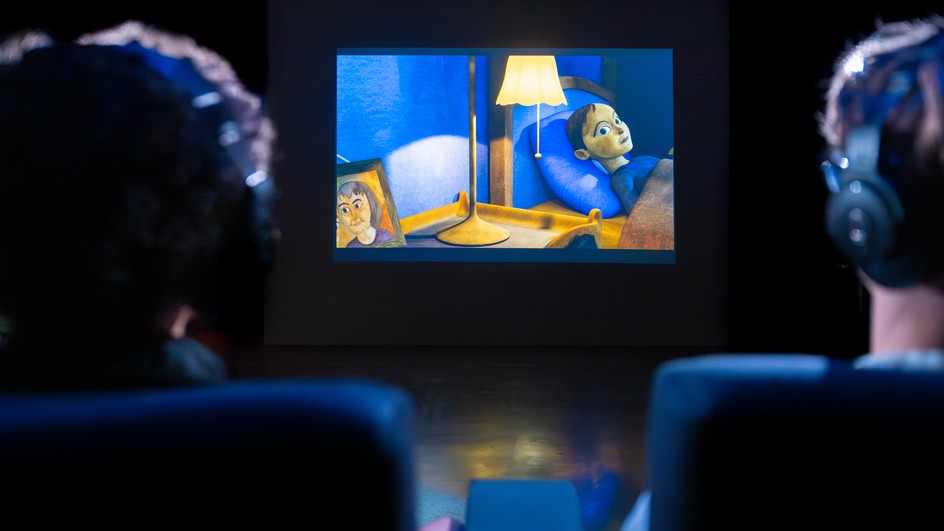
Visiting artist professor
2024 - 2025
Vinciane Despret
Born in 1959 in Anderlecht (Belgium)
"I'm going to exapt*. To do what I was made not to do," wrote Pierre Alferi.
Exaptation is an evolutionary process by which an organ or behaviour that has been selected because of the function it could perform is diverted from its intended use and used to perform another function.
In short, it involves recycling, reusing, diverting and subverting (biologists call this "opportunistic selection"). Before birds could fly, feathers were beautiful costumes.
If you want to reconstruct the story of a given journey using the exaptation model, you have a choice of several methods. But the simplest is the most obvious: find the moments when the fact that a given individual was not able (or did not know how) to do what he was supposed to do forced him to do what he was not supposed to do.
For example:
During her philosophy studies, by her own admission, Vinciane Despret read virtually no philosophers. In her defence, she found the exorbitant privilege accorded by her teachers to authors who could boast of having been dead for more than 200 years, with an even stronger preference for those with a posthumous career of over 2,000 years, rather discouraging. During the ordeal of writing her dissertation, she had to juggle with the gaps in her knowledge. She chose Michel Tournier (a philosopher, certainly, but above all a novelist) as the subject of her exegesis. The title of her text, "Analysis of a few philosophical parables in the work of M.T.") turned out to be rather misleading. However, the jury was magnanimous, not least because Vinciane Despret developed the (almost philo- sophical) idea that it was difficult to be paranoid in the Leibnizian world, and because she was recognised for her audacity in daring to go against the grain of the university's practices and discuss philosopher who did not have the good taste to be already dead.
She then learnt that her degree would not give her a job, except teaching religious studies. So she went back to studying psychology: she was going to be a therapist. But now she found she was deeply bored by theories that claimed to explain what humans were. Ethology and courses in animal psychology, on the other hand, fascinated her. Her dissertation was therefore on birds, which might seem incongruous in a clinical training course, but as this was a rare occurrence, they turned a blind eye. The degree that was supposed to lead her to usurp a job as a psychologist ended up in the drawer: the philosophy department offered her a job as a research assistant. The result was worth the detour: ethology became her passion.
For this she was required to write a thesis: she chose, sagely, the theme of the emotions – a theme with precursors in philosophy.
But now something else urgently took her attention, distracting her once again from her duty. The articles by an Israeli zoologist, Amotz Zahavi, which she had read for her dissertation, intrigued her. Zahavi wrote about Arabian babblers, birds that he had been observing for years in the Negev desert. There was something odd about them: Zahavi’s babblers did not behave like any of the birds described by other ethologists. Were they extraordinary? Were they not, rather, the fabrications of a researcher who could legitimately be suspected of not respecting the rules of science? A bird preoccupied with prestige, giving gifts and dancing with its fellow birds in the early 90s was hard to imagine.
Her plan was to go and observe this ethologist in an attempt to see how his “representations” might have led him to make statements that were as extravagant as they were unconvincing (and not just for her: Zahavi was highly controversial at the time). In fact, that’s what she was supposed to do if she wanted to do it in a properly “philosophical” way, according to the norms of the genre. It was de rigueur, in the French philosophical tradition, that animals should only be treated from the angle of “representations” or, more seriously still, of the “symbolic.” To put it more clearly: the animal could be included in philosophical discourse, provided that it was not evoked for its own sake, but as a figure, a pawn in theoretical and abstract debates.
Vinciane Despret was going to do what people were learning to do at the time: unmask the "representations" that guide (i.e. contaminate) scientists. But nothing ever goes according to plan. It didn't take her two days in the desert in the company of birds for her to find them fascinating, alive, as present as hell, and to be touched by their inventiveness and by their very singular way of solving problems. And, in turn, to see them dance. On her return, she met Isabelle Stengers and then Bruno Latour, who encouraged her to believe in what had happened to her and to break with what Derrida a few years later "the history of the philosophical animal."
As her thesis could no longer be postponed, she turned her attention to the emotions. And what saved her from an early death by boredom was, on the one hand, the philosopher William James and, on the other, the fascinating work of ethnopsychologists, who taught her to grasp the political implications of theories of the emotions.
Once she had completed hert hesis, she went back to animals, and with this exciting observation, itself a promise of interesting investigations to come: for some years now, animals had been changing. Not only were scientists recognising that they had skills that had been denied them for over a century (under the wickedly despotic reign of behaviourism, with the complicity of human exceptionalism), but they were also changing, of and in themselves, because they were having to deal with upheavals in their environments, and were therefore inventing, learning and passing on innovations. In short, because they were alive.
This would be the theme of the exhibition Bêtes et Hommes (Beasts and Men), which she was asked to curate at the Grande Halle de la Villette in 2007. What made this exhibition a success? It reflected and aroused an increasingly intense concern for other living beings. Because people were changing too. That same year, Despret herself changed the subject completely: she undertook an investigation into "those who remain": How do we stay in touch with our dead? How do we allow them to intervene in our lives? How are they still present among us? She gathered stories, but above all she learned to break with academic methods.
What she learned from the power of the stories shared with her during this adventure encouraged her to try her hand at animal fiction in Autobiographie d'un poulpe et autres récits d'anticipation (Autobiography of an Octopus and other Tales of Anticipation), notably as a way of favorising more audacious theories about animals, and imagining the scientific knowledge and practices "of the future" that are inventive, playful and definitively free of the toxic belief in the superiority of humans.
The pleasure she derives from mixing -- some- times to the point of indistinguishability -- playful fiction and reliable knowledge also led her to another experiment in imposture, in the form of a series of stories with Belgian cartoonist Pierre Kroll Darwin, Dieu, tout et n'importe quoi. Frasques de l'évolution (Arènes, September 2024), a decidedly flippant celebration of the exciting inventiveness of life.
As for her project here, she tells us that her desire, as yet very vague, is to find a form of exaptation ("to do what I'm made not to do") that leans towards animated film (Belgian- inspired if possible) and that could feature scientists and their animals.

